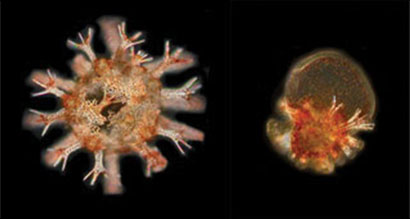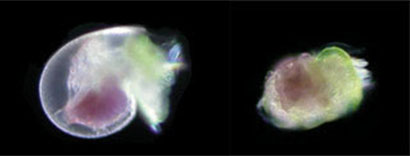Marine abalone and sea urchins will not develop skeletons if the ocean continues to warm and acidify as predicted, according to current research lead by the University of Sydney’s Schools of Medical Sciences and Biological Sciences, at environmentally significant Little Bay, near Sydney.
When exposed to the increased acidity and temperature levels projected 100 years from now they produced deformed specimens, without shells or spines. This means key sources of protein will be lost due to future changes in our oceans.

A 5-day-old sea urchin reared in today's ocean conditions, left, compared to one reared in high temperature and low pH showing abnormal appearance and reduced spines. (Image courtesy of Maria Byrne, published originally in Proceedings of the Royal Society B)
“We wondered about the impact of climate change on shelled marine animals since ocean acidification reduces the amount of carbonate ions, which they need to make their calcium carbonate skeletons,” says Professor Maria Byrne, from University of Sydney’s Schools of Biological Science and Medical Sciences.
Lead author Prof. Byrne and her team investigate how the simultaneous increase in acidity and temperature affect development from fertilised egg to juvenile stages of sea urchins and abalone, a first for any study.
“For our study, we focussed on two ecologically and commercially important groups of marine invertebrates from South-Eastern Australia, which is a climate change hotspot where the ocean is warming several times faster than the global average. We collected them from Little Bay, an open ocean area near Sydney,” she says.
The researchers raise abalone and sea urchin embryos in ocean conditions projected for the years 2100 and beyond by the Intergovernmental Panel for Climate Change. These included three temperature (current ambient, +2oC, +4oC) and three pH (current ambient, pH 7.8, pH 7.6) treatments, which were used in all combinations.
Abalone were particularly sensitive to change and did not do well in even slightly warmer and more acidic conditions (+2oC/pH 7.8).

Left, Abalone larva at 21 hours reared in today's ocean conditions, compared with one reared in mildly acidic conditions showing absence of shell. (Image courtesy of Maria Byrne, published originally in Proceedings of the Royal Society B)
The sea urchins fared better and some offspring made it to the juvenile stage in these conditions, with slight warming reducing the negative effect of lower pH. If the urchins were pushed to conditions projected beyond 2100 (+4oC) however, the juveniles produced were abnormal and had fewer spines.
Professor Byrne warns these changes will be detrimental to these two important species.
“Considering that the oceans are on an irreversible track of change for the foreseeable future and are a key source of food and prosperity for humans, it is important to consider how we are going to meet the needs of growing human population. Marine invertebrates are a major food source – some species such as abalone are unlikely to adapt, while others such as some hardy oysters may persist.”
This paper was recently published in Proceedings of the Royal Society B.
With thanks to the the University of Sydney’s Schools of Medical and Biological Sciences and Carla Avolio, Science Communicator at University of Sydney.
Byrne et al (2010). Unshelled abalone and corrupted urchins: development of marine calcifiers in a changing ocean. Proceedings of the Royal Society B. DOI 10.1098/rspb.2010.2404. Abstract









